Germany expands controls at borders to stem irregular migration and extremism risks

Your support helps us to tell the story
Find out moreClose
As your White House correspondent, I ask the tough questions and seek the answers that matter.
Your support enables me to be in the room, pressing for transparency and accountability. Without your contributions, we wouldn’t have the resources to challenge those in power.
Your donation makes it possible for us to keep doing this important work, keeping you informed every step of the way to the November election
Andrew Feinberg
White House Correspondent
Germany’s government ordered temporary controls at all land borders on Monday as a response to irregular migration and to protect the country from extremist threats.
Interior Minister Nancy Faeser said at a news conference that the government is extending temporary border controls that it already has in place at some of its borders to all German land borders.
“We are strengthening our internal security through concrete action and we are continuing our tough stance against irregular migration,” Faeser said.
The ministry said that it notified the European Union on Monday of the order to set up border controls at the land borders with France, Luxembourg, the Netherlands, Belgium and Denmark for a period of six months. They will begin next week on Sept. 16.
This adds to restrictions already in place on the land borders with Poland, the Czech Republic, Austria and Switzerland.
“Until we achieve strong protection of the EU’s external borders with the new Common European Asylum System, we must increase controls at our national borders even more,” Faeser said.
She noted that Germany already has had more than 30,000 rejections of people seeking to cross its borders since last October.
“This served to further limit irregular migration and to protect against the acute dangers posed by Islamist terrorism and serious crime. We are doing everything we can to better protect people in our country against this,” she said.
The order comes after a deadly knife attack in Soligen that killed three people. The perpetrator was inspired by the Islamic State group.
Last week, police in Munich exchanged fire with a gunman near the Israeli Consulate, fatally wounding him. Authorities said they believe he was planning to attack the consulate on the anniversary of the attack on the 1972 Munich Olympics.
Germany has accepted large numbers of refugees from the Middle East over the past decade, but now a political backlash is building, with support growing for a far-right party. That party, Alternative for Germany, won its first state election earlier this month in Thuringia.



